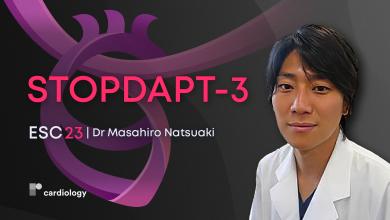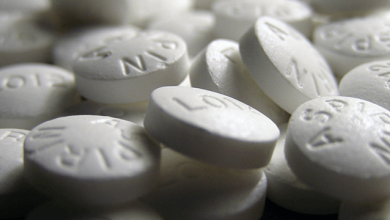Search results
Author(s):
Masahiro Natsuaki
Added:
7 months ago
ESC 23 — Dr Masahiro Natsuaki (Saga University, JP) discusses the short and optimal duration of dual antiplatelet therapy-3 Study (STOPDAPT-3) (NCT04609111).
In the STOPDAPT-2 study, 1-month dual antiplatelet therapy (DAPT) followed by clopidogrel monotherapy was shown to provide benefits in bleeding reduction over a 12-month period, however, other trials have shown high rates of bleeding at…
View more
Novel Oral Antiplatelet Agents
Author(s):
Suzanne J Baron
,
Robert P Giugliano
Added:
3 years ago
Article
Author(s):
Jack Wei Chieh Tan
,
Derek P Chew
,
Muhamad Ali SK Abdul Kader
,
et al
Added:
3 years ago
Author(s):
Patrick Wong
,
Umair Shafique
Added:
3 years ago
Cardiovascular (CV) events are a major cause of mortality worldwide1 that are often precipitated by acute coronary syndromes (ACS). ACS result from the acute obstruction of coronary arteries and are defined as either unstable angina (UA) or myocardial infarction (MI), with or without ST-segment-elevation (STEMI and NSTEMI, respectively). Patients with moderate- to high-risk ACS are managed by an…
View more
Author(s):
Diego Penela
,
Maríbel Diaz-Ricart
,
Magda Heras
Added:
3 years ago
The usual underlying mechanism of acute coronary syndromes (ACSs) is a thrombotic event caused by the rupture or erosion of an atherosclerotic plaque. In this scenario, platelets and thrombin are key players. Thus, understanding the physiopathology of platelet activation is of paramount importance in the treatment of acute coronary ischaemia. There is ample evidence showing that adequate…
View more
Author(s):
Sasha Koul
,
David Erlinge
Added:
3 years ago
Acute coronary syndromes (ACS) are a major reason for death and morbidity in the industrialised world. One of the most successful treatments for ACS has been strategies to target the platelets and inhibit their function.
Mechanisms of Platelet Activation
Thrombus formation in the arteries is dependent on platelets and their ability to attach to the injured wall despite the rapid arterial blood…
View more
Author(s):
Doreen Su-Yin Tan
Added:
3 years ago
Ischaemic heart diseases (IHD) – mainly MI – represent a large disease burden all over the world. Almost 18 million people die each year from cardiovascular diseases, accounting for 31 % of deaths globally.1 Ticagrelor, the more potent cousin of antiplatelet therapy clopidogrel, has been shown to reduce the composite endpoint of death from vascular causes, MI or stroke by an additional 16 %…
View more
Author(s):
Laurent Bonello
Added:
3 years ago
Clopidogrel is a key antiplatelet agent that inhibits the second step of platelet aggregation through blockade of the P2Y12-adenosine diphosphate (ADP) receptor.1 Its use has enabled percutaneous coronary intervention (PCI) to expand by dramatically reducing thrombotic complications in acute coronary syndromes (ACSs).2,3 Since the first report by Jaremo et al. of a large inter-individual…
View more
Author(s):
Franz-Josef Neumann
Added:
3 years ago
Acute coronary syndromes (ACS) have been associated with the occurrence of cardiovascular (CV) events. Moderate- to high-risk ACS are generally managed by an early invasive approach, where coronary angiography is followed by percutaneous coronary intervention (PCI) or coronary artery bypass grafting (CABG). However, ACS and the use of PCI or CABG are associated with a high risk of thrombotic…
View more
Platelet Function Testing in Clinical Practice - Experience and Views from Europe and the US
Author(s):
Thomas O Bergmeijer
,
Jochem Wouter van Werkum
,
Udaya S Tantry
,
et al
Added:
3 years ago
Article











